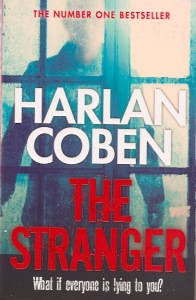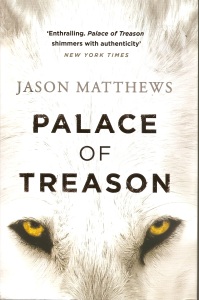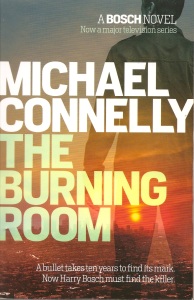In the past few weeks I have read three thought provoking John le Carre novels; The Night Manager [1993] Our Game [1995] and Absolute Friends [2003] all of which I enjoyed immensely despite reservations about their politics.
 The TV series based on John le Carre’s book The Night Manager reached it’s climax last week. As with many television adaptions of a novel you realise how good the author is when the TV version plot starts to deviate from the original. The classic case of this phenomenon was the Dalziel and Pascoe series based on the novels of Reginald Hill which when the original plots were exhausted, and some of the great characters abandoned, was a shadow of the earlier programs.
The TV series based on John le Carre’s book The Night Manager reached it’s climax last week. As with many television adaptions of a novel you realise how good the author is when the TV version plot starts to deviate from the original. The classic case of this phenomenon was the Dalziel and Pascoe series based on the novels of Reginald Hill which when the original plots were exhausted, and some of the great characters abandoned, was a shadow of the earlier programs.
In The Night Manager’s tv adaptation the alterations in the plot and the changes in chronology, geographical locations, and the sex of Burr had worked quite well up to the last episode. In the final episode the novel’s plot was totally abandoned with the result that much of the political message was lost. Of course the female audience was was catered for with scenes featuring Tom Hiddlestone, and if you have an elegant beauty such as Elizabeth Debicki constantly wandering around in floaty dresses and expensive lingerie you are likely to have a television success on your hands. But I did not approve of the scenes where her character Jed was water-boarded, this was totally unnecessary. There is enough violence towards women in real life without having to watch this sort of thing on TV.
A lot of le Carre’s emphasis in the novel was lost, and although I disagree with most of his politics, I felt the novel’s ending should have been retained. If a book is good enough to put on television surely the key message should be retained. But overall this was a gripping series, but I would respectively request there is no Night Manager Two, or we may face another Broadchurch Two debacle.
 Our Game was the next book le Carre wrote and apparently it was not as successful as some of his previous books, only reaching number 3 on the NY Times bestseller lists.
Our Game was the next book le Carre wrote and apparently it was not as successful as some of his previous books, only reaching number 3 on the NY Times bestseller lists.
I have to admit finding most of this novel hysterically funny, although I am not sure le Carre intended it to be a black comedy. Perhaps I was amused by the fact that most of the book is set in North Somerset rather than the North Caucasus.
Bath University, Bristol, the Mendips, and Priddy, where retired civil servant Tim Cranmer tries to batter his old friend Larry Pettifer into submission are fairly familiar to me.
The story begins with the disappearance of Larry, a double agent whose dedication to left wing causes includes the seduction of Tim’s mistress the beautiful young Emma. Tim has inherited a run down estate with a failing vineyard from his uncle, and more luckily a large amount of money from an aunt. He and Larry were at school together at Winchester. In the past our security services were overrun by the alumni of Westminster, Greshams, Marlborough and Eton, which did not work out too well.
The only possible benefit in having these people as spies was that if they were thrown into the Lubyanka, however badly they were treated the food was bound to be superior to that served up in an English Public school in the 1950s and 1960s.
The police investigate Larry’s disappearance……
Yet who did they think he was? -Larry, my Larry, our Larry?-What had he done? This talk of money, Russians, deals, Checheyev, me, socialism, me again- how could Larry be anything except what we had made him: a directionless middle-class revolutionary, a permanent dissident, a dabbler, a dreamer, a habitual rejector, a ruthless, shiftless, philandering, wasted semi-creative failure, too clever not to demolish an argument, too mulish to settle for a flawed one?
Strangely this passage from a 1995 novel instantly made me think of one of today’s leading British politicians.
Tim is questioned by both the police and his old employers in the security service, as they suspect he is involved in a financial scam.
In a minute you’re going to tell me it’s all in Checheyev’s weaselly imagination, he forged Larry’s signature. You’ll be wrong. Larry’s in it up to his nasty neck, and for all we know, so are you. Are you?
Tim naturally begins a convoluted search for a missing 37 million quid and the beautiful young Emma, both of which have been expropriated by Larry and Tim’s former agent Konstantin Abramovich Checheyev.
The money is intended to help the oppressed Chechen and Ingush people in the Caucasus. Tim’s search takes him from to Bristol, Paris, and Moscow and eventually to the conflict in the Caucasus. John le Carre views the situation there as very black and white but in these far away conflicts things are usually shades of grey. I wonder what the author felt when nearly decade after this novel the events took place at a place in North Ossetia called Beslan.
Absolute Friends, le Carre’s first post 9/11 political novel also had me laughing out loud on many occasions, and perhaps again I was not supposed to find this novel so amusing. The narrative tells of the long running friendship between Ted Mundy, son of a British army officer, conceived in India and born in Pakistan on partition day; and Sasha, a son of Nazi Germany brought up in the GDR. The friendship begins among the revolutionary students of West Berlin in the turbulent 1960s, and ends in ………..I won’t spoil the ending.
not supposed to find this novel so amusing. The narrative tells of the long running friendship between Ted Mundy, son of a British army officer, conceived in India and born in Pakistan on partition day; and Sasha, a son of Nazi Germany brought up in the GDR. The friendship begins among the revolutionary students of West Berlin in the turbulent 1960s, and ends in ………..I won’t spoil the ending.
Endings are not John Le Carre’s strong point, and however nuanced the narrative he seems to want to leave the reader feeling somewhat bruised, and hopefully convinced that the Americans and British are responsible for every evil in the world.
Mundy becomes a secret service agent by chance after his experiences in Berlin.
“What is the purpose of our revolution, comrade?”
Mundy had not expected a viva voce, but six months of Ilse and her friends have not left him unprepared. ” To oppose the Vietnam War by all means…To arrest the spread of military imperialism….To reject the consumer state….To challenge the nostrums of the bourgeoisie…To awaken it, and educate it. To create a new and fairer society ….and to oppose all irrational authority.”
” Irrational? What is rational authority? All authority is irrational, arsehole.”
The Soviets classified these fellow travellers as useful idiots, and unfortunately they are still around today even in the UK waving Mao’s Little Red Book and forgetting the millions who died under Communism, and it’s close relative National Socialism.
Sasha’s father was a Pastor who became a Christian Nazi, and later decamped to the obnoxious West from the GDR socialist paradise, installing a deep personal and political hatred in his son. The story explores both men’s relationship with their fathers, and the secrets they uncover.
This is a long, but highly readable book, that has many complexities as the friends frequently lose touch and then meet up again after several years and catch up with events. Mundy is never sure which side Sasha is on, or even at times which side he is on.
As a prized Stasi agent, Mundy receives a fat retainer, bonuses and incentive payments. The conventions of the trade, however require him to turn those sums over to his true masters, whose remunerations are more modest, since London unlike the Stasi, takes his loyalty for granted.
These books are well written, and are fascinating reading perhaps enhanced by our knoweledge of recent events.
 When analysing crime fiction I usually consider ten very simple factors.
When analysing crime fiction I usually consider ten very simple factors. 










